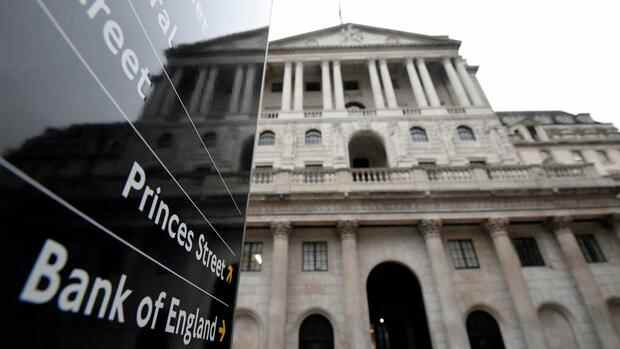In December, the British central bankers became the first of the major central banks to hike interest rates since the beginning of the pandemic.
(Photo: Reuters)
London The Bank of England is driving the turnaround in interest rates. For the second time in a few months, it raised the key interest rate by 0.25 percentage points to 0.5 percent on Thursday. The decision in the Monetary Policy Committee was made with a narrow majority of five to four votes. The four members in the minority even wanted to increase it to 0.75 percent. The central bank announced that the key interest rate could rise to 1.5 percent by mid-2023.
The reason is the rapidly rising inflation. According to the new forecast by monetary authorities, it should now reach a peak of 7.25 percent in April. That is two percentage points more than expected in November. This is mainly due to rising energy prices.
The high inflation is also likely to last longer than previously expected. The Bank of England said it would only fall back to the long-term target of two percent in two years.
The combination of high inflation and higher interest rates means that the disposable household income of the British will fall by two percent this year. In the coming year, it is expected to fall by a further 0.5 percent. Taken together, this would be the largest reduction in purchasing power since 1990.
Top jobs of the day
Find the best jobs now and
be notified by email.
As a result, according to estimates by the central bank, British economic growth will also weaken again. Unemployment is expected to initially fall to 3.8 percent in the first quarter, but then rise again to up to five percent.
Energy prices rise by 54 percent, government announces aid
These forecasts do not yet include the latest state aid, which Finance Minister Rishi Sunak announced at the same time on Thursday. The government wants to subsidize the electricity and gas bills of the British in October with 200 pounds per household.
This should cushion the rise in energy prices somewhat. Also on Thursday, the British energy regulator Ofgem announced its semi-annual adjustment of the statutory energy price cap. This increases on April 1 from 1277 pounds to 1971 pounds a year. This is the maximum amount that energy suppliers are allowed to charge end customers for electricity and gas.
The high increase of 54 percent is due to global energy prices. The government subsidy will be automatically credited to households’ electricity and gas bills in October. In the coming years, it will then be automatically repaid in five installments of £40 each.
Sunak also announced a one-off £150 rebate on Council Tax for 80 per cent of households. In this way he wants to counteract the “crisis of the cost of living”.
More: These three points are important at the ECB meeting
